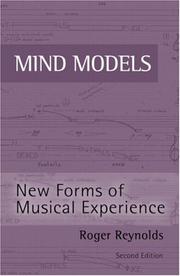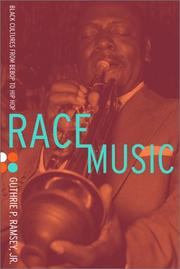| Listing 1 - 8 of 8 |
Sort by
|

ISBN: 0203036190 1299460178 1136091785 9781136091780 9780203036198 9780203036198 0415974283 9780415974288 0415974291 9780415974295 9781136091940 1136091947 9781136091865 1136091866 Year: 2005 Publisher: New York Routledge
Abstract | Keywords | Export | Availability | Bookmark
 Loading...
Loading...Choose an application
- Reference Manager
- EndNote
- RefWorks (Direct export to RefWorks)
This new edition of Mind Models reintroduces and renews a classic work on 20th century composition, one that has remained relevant for over a quarter century -- and should remain a central reading for decades to come.
Book
ISBN: 9780190616922 019061692X Year: 2020 Publisher: New York : Oxford University Press,
Abstract | Keywords | Export | Availability | Bookmark
 Loading...
Loading...Choose an application
- Reference Manager
- EndNote
- RefWorks (Direct export to RefWorks)
In the nineteenth century, ideas about music flourished in fields as disparate as philophosy an natural science, dramatically shifting the relationship between music and the broader intellectual landscape. An exciting and much-needed new volume, The Oxford Handbook of Music and Intellectual Culture in the Nineteenth Century draws deserved attention to the people and institutions of this period who worked to produce these writings. Editors Paul Watt, Sarah Collins, and Michael Allis, along with an international slate of contributors, discuss music's fascinating and unexpected interactions with debates about evolution, the scientific method, psychology, exoticism, gender, and the divide between high and low culture. Part I of the handbook establishes the historical context for the intellectual world of the period, including the significant genres and disciplines of its music literature, while Part II focuses on the century's institutions and networks - from journalists to monasteries - that circulated ideas about music throughout the world. Finally, Part III assesses how the music research of the period reverberates in the present, connecting studies in aestheticism, cosmopolitanism, and intertextuality to their nineteenth-century origins. The Handbook challenges Western music history's traditionally sole focus on musical work by treating writings about music as valuable cultural artifacts in themselves. Engaging and comprehensive, The Oxford Handbook of Music and Intellectual Culture in the Nineteenth Century brings together a wealth of new interdisciplinary research into this critical area of study.
Music --- Intellectual life --- Social aspects --- History --- History and criticism --- Muziek --- Geschiedenis en kritiek --- Music - Social aspects - History - 19th century --- Music - 19th century - History and criticism --- Intellectual life - History - 19th century --- Musique --- Vie intellectuelle --- Aspect social

ISBN: 0521622069 052162732X 0511009372 1280418826 0511489439 051105047X 051132443X 0511149158 0511171803 1107111099 9780511489433 9780511009372 9781280418822 9780511050473 9786610418824 6610418829 9780511149153 9780521622066 9780521627320 9781107111097 9780511171802 Year: 2000 Publisher: Cambridge : Cambridge University Press,
Abstract | Keywords | Export | Availability | Bookmark
 Loading...
Loading...Choose an application
- Reference Manager
- EndNote
- RefWorks (Direct export to RefWorks)
The power of music to influence mood, create scenes, routines and occasions is widely recognised and this is reflected in a strand of social theory from Plato to Adorno that portrays music as an influence on character, social structure and action. There have, however, been few attempts to specify this power empirically and to provide theoretically grounded accounts of music's structuring properties in everyday experience. Music in Everyday Life uses a series of ethnographic studies - an aerobics class, karaoke evenings, music therapy sessions and the use of background music in the retail sector - as well as in-depth interviews to show how music is a constitutive feature of human agency. Drawing together concepts from psychology, sociology and socio-linguistics it develops a theory of music's active role in the construction of personal and social life and highlights the aesthetic dimension of social order and organisation in late modern societies.
Sociology of culture --- Music --- Social psychology --- Musique --- Social aspects --- Psychology. --- Aspect social --- Psychologie --- Social aspects. --- Psychological aspects. --- Psychological aspects --- -Music --- -#SBIB:309H140 --- #SBIB:012.AANKOOP --- Art music --- Art music, Western --- Classical music --- Musical compositions --- Musical works --- Serious music --- Western art music --- Western music (Western countries) --- Populaire muziek: algemene werken --- Music. --- Music - Psychological aspects. --- Music Philosophy --- Music, Dance, Drama & Film --- Music psychology --- Music and society --- Psychology --- #SBIB:309H140 --- 78.87.1 --- Social Sciences --- Sociology --- Music - Social aspects. --- Music - Social aspects --- Music - Psychological aspects

ISBN: 0192880608 9780192880604 9780198163329 0198163320 Year: 1996 Publisher: Oxford Oxford University Press
Abstract | Keywords | Export | Availability | Bookmark
 Loading...
Loading...Choose an application
- Reference Manager
- EndNote
- RefWorks (Direct export to RefWorks)
Who's better? Billie Holiday or P.J. Harvey? Blur or Oasis? Dylan or Keats? And how many friendships have ridden on the answer? Such questions aren't merely the stuff of fanzines and idle talk; they inform our most passionate arguments, distil our most deeply held values, make meaning of our ever-changing culture. In Performing Rites, one of the most influential writers on popular music asks what we talk about when we talk about music. What's good, what's bad? What's high, what's low? Why do such distinctions matter? Instead of dismissing emotional response and personal taste as inaccessible to the academic critic, Simon Frith takes these forms of engagement as his subject and discloses their place at the very centre of the aesthetics that structure our culture and colour our lives. Taking up hundreds of songs and writers, Frith insists on acts of evaluation of popular music as music. Ranging through and beyond the twentieth century, Performing Rites puts the Pet Shop Boys and Puccini, rhythm and lyric, voice and technology, into a dialogue about the undeniable impact of poplar aesthetics on our lives. How we nod our heads or tap our feet, grin or grimace or flip the dial; how we determine what's sublime and what's for real - these are part of the way we construct our social identities, and an essential response to the performance of all music. Frith argues that listening itself is a performance, both social gesture and bodily response. From how they are made to how they are received, popular songs appear here as not only meriting aesthetic judgements but also demanding them, and shaping our understanding of what all music means
-Music and society --- Music --- Social aspects --- Popular music --- History and criticism --- Philosophy and aesthetics --- -#SBIB:309H140 --- #SBIB:AANKOOP --- Music and society --- Music, Popular --- Music, Popular (Songs, etc.) --- Pop music --- Popular songs --- Popular vocal music --- Songs, Popular --- Vocal music, Popular --- Cover versions --- Art music --- Art music, Western --- Classical music --- Musical compositions --- Musical works --- Serious music --- Western art music --- Western music (Western countries) --- Populaire muziek: algemene werken --- Popular music - Social aspects --- Popular music - History and criticism --- Music - Philosophy and aesthetics --- -Philosophy and aesthetics
Book
ISBN: 9058673286 9789058673282 Year: 2003 Volume: 31 Publisher: Leuven Universitaire Pers Leuven
Abstract | Keywords | Export | Availability | Bookmark
 Loading...
Loading...Choose an application
- Reference Manager
- EndNote
- RefWorks (Direct export to RefWorks)
Willaert, Adriaen --- Componisten --- Compositeurs --- Klassieke muziek --- Musique classique --- Willaert, Adriaan --- Willaert, Adrian --- Composers --- Motets --- Music --- Musique --- History and criticism. --- Social aspects --- History --- Histoire et critique --- Aspect social --- Histoire --- Willaert, Adrian, --- Venice (Italy) --- Venise (Italie) --- Social conditions --- Conditions sociales --- History and criticism --- 78 WILLAERT, ADRIAAN --- Academic collection --- Muziek--WILLAERT, ADRIAAN --- 78 WILLAERT, ADRIAAN Muziek--WILLAERT, ADRIAAN --- Art music --- Art music, Western --- Classical music --- Musical compositions --- Musical works --- Serious music --- Western art music --- Western music (Western countries) --- Motet --- Motets - History and criticism --- Music - Social aspects - Italy - Venice - History - 16th century --- Willaert, Adrian, - 1490?-1562 - Motets --- Venice (Italy) - Social conditions - To 1797 --- Motetten --- Muziekpsychologie --- Venetië --- 16e eeuw
Book
ISBN: 9780262013475 0262013479 0262517957 0262266334 0262258838 0262258838 9780262258838 9780262266338 9780262517959 9780262258838 128254179X 9786612541797 Year: 2010 Publisher: Cambridge, MA : MIT Press,
Abstract | Keywords | Export | Availability | Bookmark
 Loading...
Loading...Choose an application
- Reference Manager
- EndNote
- RefWorks (Direct export to RefWorks)
"Sound can be deployed to produce discomfort, express a threat, or create an ambience of fear or dread - to produce a bad vibe. Sonic weapons of this sort include the "psychoacoustic correction" aimed at Panama strongman Manuel Noriega by the U.S. Army and at the Branch Davidians in Waco by the FBI, sonic booms (or "sound bombs") over the Gaza Strip, and high-frequency rat repellants used against teenagers in malls. At the same time, artists and musicians generate intense frequencies in the search for new aesthetic experiences and new ways of mobilizing bodies in rhythm. In Sonic Warfare, Steve Goodman explores these uses of acoustic force and how they affect populations." "Most theoretical discussions of sound and music cultures in relationship to power, Goodman argues, have a missing dimension: the politics of frequency. Goodman supplies this by drawing a speculative diagram of sonic forces, investigating the deployment of sound systems in the modulation of affect. Traversing philosophy, science, fiction, aesthetics, and popular culture, he maps a (dis)continuum of vibrational force, encompassing police and military research into acoustic means of crowd control, the corporate deployment of sonic branding, and the intense sonic encounters of sound art and music culture." "Goodman concludes with speculations on the not yet heard - the concept of unsound, which relates to both the peripheries of auditory perception and the unactualized nexus of rhythms and frequencies within audible bandwidths."--Jacket.
Music --- Acoustics and physics --- Social aspects --- Philosophy and aesthetics --- Acoustics and physics. --- Social aspects. --- Philosophy and aesthetics. --- cultuurfilosofie --- muziek --- geluid --- klank --- politiek --- akoestiek --- fysica --- akoestiek en politiek --- akoestiek en angst --- angst --- psychologie --- 130.2 --- Music and society --- Hermeneutics (Music) --- Musical aesthetics --- Aesthetics --- Music theory --- Musical acoustics --- Physics --- Sound --- Monochord --- Philosophy --- Music - Acoustics and physics --- Music - Social aspects --- Music - Philosophy and aesthetics --- Music - psychology --- Sound - adverse effects --- Acoustic Stimulation - adverse effects --- Fear - psychology --- Son --- Acoustique appliquée --- Psychologie --- DIGITAL HUMANITIES & NEW MEDIA/General --- COMPUTER SCIENCE/Computer Music --- SOCIAL SCIENCES/Political Science/General --- Acoustic Stimulation --- Fear

ISBN: 0415162920 0415162912 9780415162920 Year: 1998 Publisher: London New York Routledge
Abstract | Keywords | Export | Availability | Bookmark
 Loading...
Loading...Choose an application
- Reference Manager
- EndNote
- RefWorks (Direct export to RefWorks)
Music --- Moral and ethical aspects. --- Social aspects. --- Philosophy and aesthetics. --- Music and society --- Hermeneutics (Music) --- Musical aesthetics --- Aesthetics --- Music theory --- Music and morals --- Moral and ethical aspects --- Philosophy and aesthetics --- Social aspects --- Philosophy --- Adorno, Theodor W., --- Wiesengrund, Theodor, --- Wiesengrund-Adorno, Theodor, --- Adorno, Teodor V., --- Adorŭno, --- אדורנו, תאודור --- אדורנו, ת. ו. --- Adorno, Th. W. --- Criticism and interpretation. --- Sociology of culture --- Adorno, Theodor W. --- Musique --- Aspect social --- Philosophie et esthétique --- Adorno, Theodor Wiesengrund --- Criticism and interpretation --- Music - Moral and ethical aspects. --- Music - Social aspects. --- Music - Philosophy and aesthetics. --- Adorno

ISBN: 0520210484 9780520243331 0520243331 1282358014 9786612358012 0520938437 1597348465 9780520938434 9780520210486 9781597348461 9780520210486 9780520243330 9782002068455 2002068453 9781282358010 6612358017 Year: 2003 Volume: 7 Publisher: Berkeley, CA : University of California Press,
Abstract | Keywords | Export | Availability | Bookmark
 Loading...
Loading...Choose an application
- Reference Manager
- EndNote
- RefWorks (Direct export to RefWorks)
This powerful book covers the vast and various terrain of African American music, from bebop to hip-hop. Guthrie P. Ramsey, Jr., begins with an absorbing account of his own musical experiences with family and friends on the South Side of Chicago, evoking Sunday-morning worship services, family gatherings with food and dancing, and jam sessions at local nightclubs. This lays the foundation for a brilliant discussion of how musical meaning emerges in the private and communal realms of lived experience and how African American music has shaped and reflected identities in the black community. Deeply informed by Ramsey's experience as an accomplished musician, a sophisticated cultural theorist, and an enthusiast brought up in the community he discusses, Race Music explores the global influence and popularity of African American music, its social relevance, and key questions regarding its interpretation and criticism. Beginning with jazz, rhythm and blues, and gospel, this book demonstrates that while each genre of music is distinct-possessing its own conventions, performance practices, and formal qualities-each is also grounded in similar techniques and conceptual frameworks identified with African American musical traditions. Ramsey provides vivid glimpses of the careers of Dinah Washington, Louis Jordan, Dizzy Gillespie, Cootie Williams, and Mahalia Jackson, among others, to show how the social changes of the 1940's elicited an Afro-modernism that inspired much of the music and culture that followed. Race Music illustrates how, by transcending the boundaries between genres, black communities bridged generational divides and passed down knowledge of musical forms and styles. It also considers how the discourse of soul music contributed to the vibrant social climate of the Black Power Era. Multilayered and masterfully written, Race Music provides a dynamic framework for rethinking the many facets of African American music and the ethnocentric energy that infused its creation.
African Americans in popular culture --- Afro-Americains dans la culture populaire --- Afro-Amerikanen in de volkscultuur --- African Americans - Music - History and criticism. --- African Americans in popular culture. --- Popular music - Social aspects - United States. --- Music History & Criticism, National - Folk, Patriotic, Political --- Music --- Music, Dance, Drama & Film --- African Americans --- Popular music --- History and criticism. --- Social aspects --- Afro-Americans in popular culture --- Popular culture --- Music, Popular --- Music, Popular (Songs, etc.) --- Pop music --- Popular songs --- Popular vocal music --- Songs, Popular --- Vocal music, Popular --- Cover versions --- History and criticism --- United States --- african american music. --- african americans. --- afro modernism. --- american history. --- bebop. --- black americans. --- black communities. --- black culture. --- black music. --- black power era. --- chicago. --- cootie williams. --- cultural theorists. --- dinah washington. --- dizzy gillespie. --- ethnocentric. --- gospel music. --- hip hop. --- jam sessions. --- jazz. --- louis jordan. --- mahalia jackson. --- music and culture. --- musical meaning. --- musical styles. --- musicology. --- nonfiction. --- racial issues. --- rhythm and blues. --- social changes.
| Listing 1 - 8 of 8 |
Sort by
|

 Search
Search Feedback
Feedback About
About Help
Help News
News